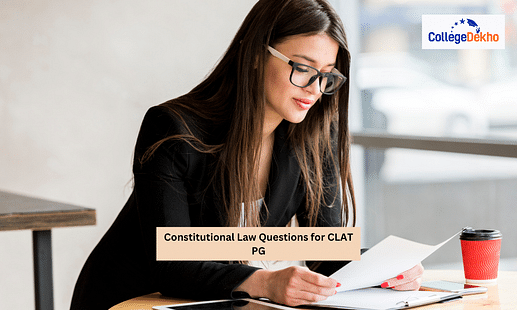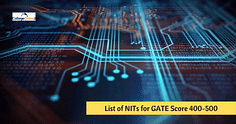
Constitutional law questions for CLAT PG focus on your understanding of legal principles and case laws. In these questions, you will be asked to test your ability to understand the Indian Constitution through rights, duties and government powers. Questions on main rights of fundamental rights such as scope of Article 14 (Right to Equality), Article 19 (Freedom of Speech) can be expected.
You might also need to analyse case laws like Kesavananda Bharati or Navtej Singh Johar to know their constitutional significance. You often need to apply these constitutional law principles to hypothetical scenarios created in questions pertaining to law entrance exams. For example, to balance individual liberty with public interest.
There may be questions about federalism, the relationship of the center and states as per Article 246 or Article 256. You may want to take a look at parliamentary privileges, judicial independence and separation of powers. For example, questions may come on power of the Supreme Court under Article 142 or judicial review under Article 13. However, what is needed is practical understanding of amendments like 42nd and 44th, their effect on democratic functioning.
Solve questions relating to the constitutional doctrines of 'basic structure', 'colorable legislation' etc. Take, for example, how 'basic structure' doctrine might be used to limit Parliament’s power to amend. However, a question testing your knowledge on emergency provisions and how they might have been abused in the 1975 emergency, may come in the exam. Find out about reservation policies under Articles 15(4), 16(4) and some recent debates including the validity of the EWS Quota.
Study take on conflicts such as freedom of religion versus the right to equality – Sabarimala Temple case law. Be updated with amendments and new cases in the Supreme Court. Previous question papers and mock test solving will sharpen your analytical skills. Write smart and concentrate on clarity and reasoning.
Also Read:
Criminal Law in CLAT PG 2025
Constitutional Law Questions for CLAT PG 2025
Below is the list of some important multiple choice questions (MCQs) on constitutional law which may help in the preparation for CLAT PG 2025. These questions are based on previous years’ papers and cover important ideas, leading judgments, and sections of the Indian Constitution:Which of the following is not a Fundamental Right under the Indian Constitution?
a) Right to Equality
b) Right to Freedom
c) Right to Property
d) Right against Exploitation
Answer: c)
The basic structure doctrine was established in which case?
a) Kesavananda Bharati v. State of Kerala
b) Maneka Gandhi v. Union of India
c) Minerva Mills Ltd. v. Union of India
d) S.R. Bommai v. Union of India
Answer: a)
Which Article of the Constitution provides for the amendment procedure?
a) Article 356
b) Article 368
c) Article 370
d) Article 14
Answer: b)
The concept of 'Judicial Review' is derived from which of the following?
a) Constitution of India
b) British Constitution
c) American Constitution
d) French Constitution
Answer: c)
Which part of the Indian Constitution deals with Fundamental Duties?
a) Part II
b) Part III
c) Part IV-A
d) Part V
Answer: c)
The right to life and personal liberty is guaranteed under which Article?
a) Article 19
b) Article 21
c) Article 22
d) Article 23
Answer: b)
Which of the following Articles allows the President to legislate by ordinance?
a) Article 123
b) Article 124
c) Article 125
d) Article 126
Answer: a)
The power to declare a law as unconstitutional is vested in which body?
a) Parliament
b) Supreme Court of India
c) President of India
d) High Courts
Answer: b)
Which amendment abolished the right to property as a Fundamental Right?
a) 44th Amendment Act
b) 42nd Amendment Act
c) 61st Amendment Act
d) 73rd Amendment Act
Answer: a)
What is the maximum number of members in the Rajya Sabha?
a) 250
b) 238
c) 245
d) 300
Answer: a)
Which one of the following is not included in the Directive Principles of State Policy?
a) Right to work
b) Right to education
c) Right to health
d) Right to property
Answer: d)
In which case did the Supreme Court hold that 'the right to privacy is part of the right to life'?
a) K.S. Puttaswamy v. Union of India
b) Maneka Gandhi v. Union of India
c) Navtej Singh Johar v. Union of India
d) Shafin Jahan v. Asokan K.M.
Answer: a)
What does Article 14 guarantee?
a) Equality before law
b) Freedom of speech
c) Protection against discrimination
d) Right to education
Answer: a)
Which amendment introduced the Goods and Services Tax (GST)?
a) 101st Amendment
b) 100th Amendment
c) 99th Amendment
d) 102nd Amendment
Answer: a)
The President can be impeached for violation of which provision?
a) Constitutional provisions
b) Criminal law
c) Both A and B
d) None of the above
Answer: a)
Which article provides for the establishment of Panchayati Raj institutions?
a) Article 40
b) Article 45
c) Article 243B
d) Article 246
Answer: c)
Who has the authority to appoint the Prime Minister of India?
a) President
b) Lok Sabha
c) Rajya Sabha
d) Chief Justice
Answer: a)
Which one among the following is not an essential feature of federalism in India?
a) Distribution of powers between centre and state
b) Supremacy of constitution
c) Dual citizenship
d) Independence of judiciary
Answer: c)
What is the term used for laws passed by Parliament during an emergency?
a) Ordinances
b) Statutes
c) Emergency laws
d) Provisional laws
Answer: b)
Which article empowers Parliament to make laws for implementing international treaties?
a) Article 253
b) Article 245
c) Article 246
d) Article 248
Answer: a)
The concept of 'separation of powers' is borrowed from which constitution?
a) British
b) American
c) Canadian
d) Australian
Answer: b)
Under which article can the President appoint Governors for states?
a) Article 153
b) Article 155
c) Article 156
d )Article 157
Answer: b)
Which one among the following rights is not available to non-citizens in India?
a) Right to equality before law
b) Right against discrimination
c) Right to freedom of speech and expression
d) Right to constitutional remedies
Answer: d)
The idea of 'social justice' is enshrined in which part of the Constitution?
a) Fundamental Rights
b) Directive Principles of State Policy
c) Fundamental Duties
d) Preamble
Answer: b)
Who can initiate impeachment proceedings against the President?
a) Any citizen
b) Vice President
c) Any member of Parliament
d) Prime Minister
Answer: c)
The Constitution provides that no person shall be punished for an act that was not an offence at the time it was committed under which article?
a) Article 20(1)
b) Article 21
c) Article 22(1)
d) Article 19(1)(G)
Answer: a)
Which part deals with citizenship in India?
a) Part I
b) Part II
c) Part III
d) Part IV
Answer: b)
What is required for an amendment to be made under Article 368?
a )Simple majority
b) Absolute majority
c) Special majority
d) Unanimous consent
Answer: c)
The President's Rule can be imposed under which article in case there is failure of constitutional machinery in states?
a) Article 356
b) Article 360
c) Article 352
d) Article 368
Answer: a)
Who has the power to dissolve Lok Sabha before its term expires?
a) President
b) Prime Minister
c) Speaker
d) Vice President
Answer: a)
Also Read: Important Books to Prepare for CLAT Legal Reasoning 2025
Most Important Topics of Constitutional Law for CLAT PG 2025
Here are some of the most important topics of constitutional law for CLAT PG 2025 that you should put more emphasis on because the majority of questions come from these topics:Topics | Description |
|---|---|
Basic Structure of the Constitution | Acquiring core knowledge of the Indian Constitution such as the Constitution’s features and the meaning of the Preamble to the Constitution. |
Fundamental Rights and Duties | Constitutional analysis of Articles 12-35 involving assessment of citizens’ rights and freedoms such as; the right to equality, Right to freedom, and Right against discrimination. |
Separation of Powers | Research on division of powers ensuring the independence of the legislature, executive branch, and judicial body and the control they exercise over one another. |
Judicial Review | Analysis of the powers vested in the courts to void laws and executive acts as being unconstitutional, with reference to some historical cases. |
Writ Jurisdiction | Analysing the specifics of the different writs (Habeas Corpus, Mandamus, Prohibition, Quo warranto, Certiorari), and the role they play in the preservation of individual liberties. |
Constitutional Amendments | Knowledge of major changes made in the Constitution and their consequences, and important judgements made in respect of such alterations. |
Federalism | Issues relating to the distribution of powers between the Centre and States like subjects of concurrent list and state’s rights. |
Election Law | Power of the constitution in relation to the elections in India concerning electoral rights and the Election Commission. |
Emergency Provisions | Examination of Articles 352,356 and 360 which provide the conditions under which a national or state of emergency can be declared and the effect that it has on citizen rights. |
Landmark Judgments in Constitutional Law | Assessment of certain selected Supreme Court decisions that have shaped the constitutional law and growth of India (Kesavananda Bharati case, etc.). |
Tips to Revise Constitutional Law for CLAT PG 2025
Here are some of the specific tips to prepare constitutional law questions for CLAT PG 2025:- One needs to understand specific attributes like sovereignty, single citizenship, and the quasi-federal state.
- Learn about the Preamble which gives a background and the goals of the Constitution.
- Review Articles 12 to 35, with a focus on their importance and contextual linkages (Articles 14, 19 and 21).
- Relate the detailed description of the Fundamental Duties as provided under Article 51A.
- Understand the role of DPSPs in orienting state policy and its connection with Fundamental Rights.
- Understand the functioning of major constitutional institutions such as the Judiciary, the Legislature and other commissions.
- Comparatively evaluate the different types of writs, namely Habeas Corpus, Mandamus, Prohibition, Quo warranto, and Certiorari.
- Incorporate recent major changes to the Constitution and key constitutional law decisions over the past few years to your knowledge.
- Make brief notes for each subject, emphasising significant articles, leading cases, and doctrines.
- Use flowcharts when establishing correlations between various sections of the constitution.
- Solve the past CLAT PG question papers to know the type of questions asked and the areas that are often covered.
- Use flashcards to write down the key doctrines of the course and the summary of the cases to improve your understanding and memory.
- This also involves taking mock tests to review and check on the time taken in each part of the examination.
- Teaching important topics from this section also enables the understanding and absorption of knowledge and, therefore, it should be done within study groups or with peers.
- Read the latest articles in newspapers and magazines on current constitutional law issues as these are often incorporated in examination questions.
- Commit to reading the bare acts of the Constitution of India at least once a month for acquaintances with the language and provisions.
Also Read: Important Topics for CLAT 2025 GK and Current Affairs
For revising constitutional law questions for CLAT PG, you require a plan and consistent hard work. Read the Constitution really thoroughly from start to finish—go over the important articles, schedules, and amending procedures first. Write down short notes with important provisions on Fundamental Rights; Directive Principles; and Federal Structure.
Find out trusted commentaries and case laws of Kesavananda Bharati and S.R. Bommai. Break long chapters into smaller topics so you can focus better on revision. Remember key points in complex cases by summarising those cases in your own words.
Read past CLAT PG papers to gain a basic idea of the question pattern. Forget rote memorization, stress more about conceptual clarity. Regularly solve MCQs specifically, the landmark judgments and the trend of constitutional doctrines. When you put concepts into practice, you start to feel comfortable.
Making a checklist of topics like Emergency Provisions, Separation of Powers and Judicial Review is the next. Only tick off the sections after complete revision to know your path and progress.
Keep going back to your notes and do frequent revisions. To remember articles or cases that appear frequently enough in exams, use flashcards. Article 21, for example, and its scope under cases such as Maneka Gandhi vs Union of India, have to be very well understood.
You must study thoroughly all the recent constitutional developments as well as amendments. Constitutional provisions are interpreted dynamically by courts, which is why it is important to know them.
Study comparative questions on important doctrines, such as Basic Structure and Separation of Powers from other jurisdictions if they are present in any important landmark judgments.
Group studies too can help you test your knowledge and fill the gaps. To reinforce what you know, teach peers a topic. Follow the latest case updates using digital tools around you, for instance legal apps and online resources.
For more latest updates on Constitutional Law Questions for CLAT PG 2025, stay tuned to CollegeDekho . Also, for any query head to our Q&A Zone or fill out our Common Application Form .
















Similar Articles
CLAT First Selection Merit List 2025: NLU-wise Allotment List PDF, Cutoff
Mistakes to Avoid while Applying for AILET 2025
What is the Required CLAT 2025 Rank for NLSIU Bangalore Admission?
What is the Required CLAT 2025 Rank for NALSAR Hyderabad Admission?
What is the Required CLAT 2025 Rank for NLIU Bhopal Admission?
What is the Required CLAT 2025 Rank for NLU Jodhpur Admission?